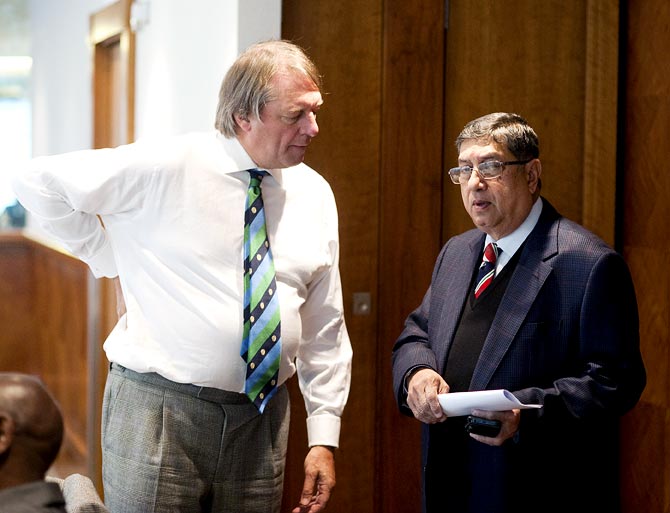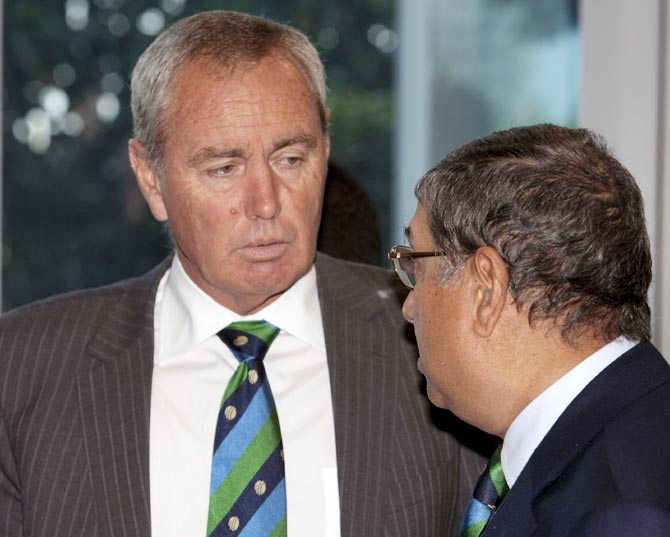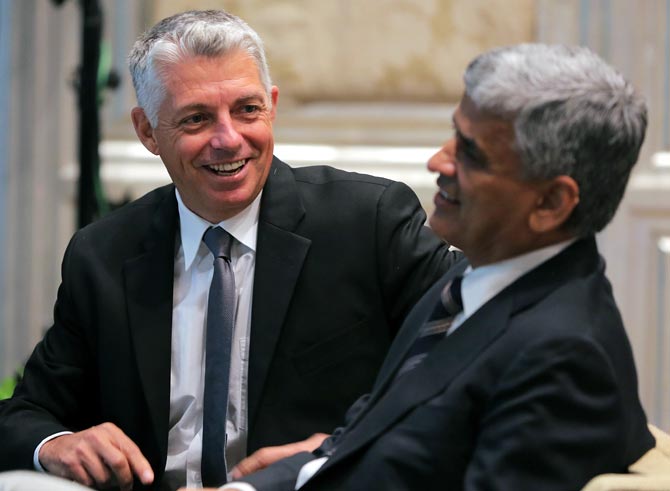Photographs: Charlie Crowhurst/Getty Images
The Board of Control for Cricket in India will have its task cut out as it pushes for a lion's share of revenue from the ICC's earnings, along with the boards from England and Australia, at the two-day executive board meeting of the governing body in Dubai, on Tuesday.
It will be a 'three versus seven' fight at the meeting, with the BCCI, Cricket Australia and the England and Wales Cricket Board having prepared a 'Position Paper' that will allow these three boards to control the parent body's functioning.
In fact, the BCCI has already made it clear that their participation in the future International Cricket Council events (50 and 20-over World Cups) will be decided subject to approval of the 'Position Paper'.
As per ICC rules, seven of the 10 Board members (Test-playing nations) need to approve the controversial proposal.
However, Sri Lanka Cricket (SLC) and Cricket South Africa (CSA) have already publicly expressed dissatisfaction with the contents of the 'Position Paper'.
There is also talk that the BCCI wants an ICC event every two years in India, and overruling of the ICC's FTP (Future Tours & Programme) by engaging in direct discussion with respective cricket boards for bilateral series.
Srinivasan is the hot favourite to become the first ICC chairman
Image: BCCI president N Srinivasan with ICC president Alan IsaacPhotographs: Jack Dabaghian/Getty Images for ICC
There will also be discussion on creating a post of ICC chairman, which will rotate between the BCCI, CA and ECB, with N Srinivasan being the hot favourite to become the first chairman.
The post will also effectively turn the ICC president into a virtual 'rubber-stamp'.
According to BCCI sources, its president Srinivasan has already promised members of affiliated units a bigger grant if his body gets a lion's share.
So far, there have been series of meetings -- Chief Executives' Committee meeting that included meeting of Working Groups on DRS and Anti-Corruption, followed by the meeting of both the Finance and Commercial Affairs Committee and Governance Review Committee -- at the ICC Headquarters in Dubai Sports City.
But, on Tuesday, the focus will solely be on the proposal of the 'Big Three' -- India (BCCI), Australia (CA) and England (ECB) -- when they officially table the bid to take over world cricket.
This plan of overhaul will effectively shrink the power of the world body significantly.
Some member boards might resist the takeover bid from BCCI, ECB and CA
Image: David Richardson, Chief Executive Officer of International Cricket Council (left) with BCCI secretary Sanjay PatelPhotographs: Ritam Banerjee/Getty Images
Miffed with the changes being proposed in the ICC's administrative structure, ex-ICC top officials Malcolm Gray and Malcolm Speed, former West Indies captain Clive Llyod, along with former Pakistan Cricket Board presidents Shahryar Khan and Lt Gen (retd) Tauqir Zia, and former ICC chief Ehsan Mani have expressed displeasure and opposed it.
Gray, a former ICC chief, and Speed, a former ICC CEO, have broken away from their national board's position by taking a stand against the proposal.
Lloyd was a one-time chairman of the ICC Cricket Committee as well as ICC match referee.
According to reports, the former top officials have signed a formal letter and sent it to the ICC and member nations requesting that the 'big three' proposal be immediately withdrawn.
All signatories agreed that the ICC needed to re-examine the conclusions of the 2012 Woolf Report into ICC governance, which recommended, among other things, an improvement in governance standards, the appointment of independent board directors and greater transparency.
The letter was accompanied by Mani's analysis of the proposal, which raised many concerns about the conflicted interests of its authors -- the BCCI, CA and the ECB -- and the revenue modelling they are suggesting.
Most of the member boards though haven't yet made their stance clear on the working paper and proposals, but there are indications that they might resist the takeover bid of world cricket by the three nations.
The ICC Board consists of the chairman or president from each of the 10 full members, plus three elected associate member representatives.
The ICC president, who chairs the proceedings, the ICC chief executive and the ICC vice-president will also be present at the crucial meeting.




Comment
article